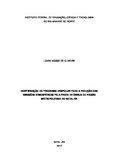Contribuição do Programa Despoluir para a redução das emissões atmosféricas pela frota de ônibus da Região Metropolitana do Natal-RN

Visualizar/
Data
2017-07-31Autor
Oliveira, Luara Musse de
http://lattes.cnpq.br/6669056902685479
Metadado
Mostrar registro completoResumo
The Metropolitan Region of Natal (MRN) has experienced the problems that the great urban centers suffer and one of the points is the increase of the vehicular fleet in the last decade and its influence in the quality of the air. The Depollute Program develops vehicular measurements based on the standards established by PROCONVE related to the operational performance of the public passenger transport fleet of NMR by checking the levels of opacity. The main objective of this research is to evaluate the activities of the Depollute Program and its implications for improving the atmospheric emissions of CO2 and Particulate Matter between 2010 and 2014 in MRN. This research is configured as a quantitative and explanatory type, using bibliographical and documentary research as methodology, and used the data related to the measurements accomplished by coordination of the Program. It was done an interpretative analysis of the data provided and the methodology used to determine CO2 emissions took into consideration the Fuel Consumption Index (FCI) and the CO2 Emission Factor for diesel fuel, and the analysis for particulate matter (PM) was made based on opacity. According to the data presented, the fleet studied corresponds to 0.2% of the total vehicle fleet of RMN and is responsible for issuing an average of 1,115 kg of CO2 per kilometer. It was verified that the greater the positive variation of the fleet approval index, the CO2 emission will have its inversely proportional variation. About the PM, it was demonstrated that more than 87% of the calibrated vehicles are within the opacity standard required by CONAMA Resolution 418/2009, showing a direct correlation between approval rating, FCI consumption index and consequently lower emissions of CO2 and material Particulate matter in the atmosphere. As such, this program contributes to the improvement of the operational positions of the passenger transport companies and thus to reductions in atmospheric emissions from the transport sector. It is recommended that public policies focused on ambient air quality, focusing on mobile sources, should be done focused on private cars and motorcycles, since these categories of vehicles represent the highest percentage of vehicles running on MRN.



